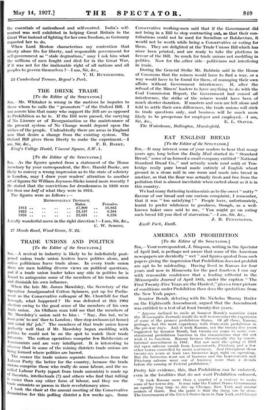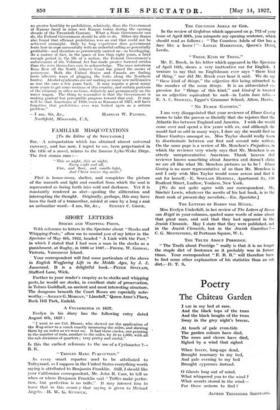AMERICA AND PROHIBITION
[To the Editor of the SPECTATOR.] SIR,—Your correspondent, J. Simpson, writing in the Spectator
of April 2nd, is perhaps not aware that some of the American newspapers are decidedly " wet " and figures quoted from such papers giving the impression that Prohibition does not prohibit
are apt to be misleading. Having lived in Kansas for four years and now in Minnesota for the past fourteen I can say with reasonable confidence that a leading editorial in the Minneapolis Journal of April 18th, under the caption " The First Twenty-Five Years are the Hardest," gives a truer picture
of conditions under Prohibition than does the quotations from the New York paper.
Senator Borah, debating with Dr. Nicholas Murray Butler on the Eighteenth Amendment, argued that the Amendment was entitled to a test of at least twenty-five years.
" Anyone inclined to smile at Senator Borah's assertion (says the 41 inneapolio Journal) would do well to remember the experience of some of the pioneer prohibition States. Of all these, Kansas, perhaps, had the most experience with State-wide prohibition in the pro-war days. And it took Kansas, not the twenty-five years suggested by Senator Borah, but twenty-six years to make con- stitutional prohibition function in the communities that did not wish it to function. Kansas became theoretically dry by consti- tutional amendment in 1881. But not until the spring of 191)7 did open saloons vanish from Leavenworth, Pittsburg and a few other towns controlled by moist sentiment. And throughout those twenty-six years at least two breweries kept right on operating. But the breweries wont out of business and the Leavenworth and Pittsburg saloons went out of business more than a decade before the coming of Federal prohibition."
Pretty fair evidence, this, that Prohibition can be enforced, even in the localities that do not want Prohibition enforced.
"It took Kansas more than a quarter of a century to mako some of her towns dry. It may take the United States Government an equally long time to dry up Chicago, New York and similar centers of thirst. But the point in that the thing can be done. The Government of the United States faces in New York and Chicago no greater hostility to prohibition, relatively, than the Government of Kansas faced in some wet Kansas towns during the opening decade of the Twentieth Century. What .a State Government-can do, the Federal Government should be able to do. Other dry States also found that efficient prohibition was an end that could not bo achieved overnight. Only 'by long- experience does government learn how to cope successfully with an unlawful calling so potentially profitable—and therefore so persistently carried on—as bootlegging. As a matter of fact, in the space of less than eight years, a brief enough period in the life of a nation, the Federal Government's enforcement of the Volstead Act has made greater forward strides than the wets themselves care to acknowledge. The once notorious Rum Row off the North Atlantic Coast has joined the snows of yesteryear. Both the United States and Canada are finding more effective ways of plugging the leaks along the Northern border. Alcohol syndicates are not making as many new millionaires as was the case a few years back. It may require a great many more years to get. some sections of this country, and certain portions of the citizenry in other sections, definitely, and permanently on the water wagon. The thing to remember is that the Government is making gradual but perceptible progress toward that end. It may well be that Americans of 1950, even as Kansans of 1927, will have forgotten that prohibition ever was looked upon as a serious problem."
—I am, Sir, &e., HARRIAT W. PATTON.
Northfield, Minnesota, U.S.



























































 Previous page
Previous page